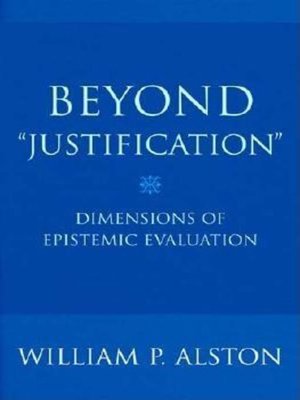
Sign up to save your library
With an OverDrive account, you can save your favorite libraries for at-a-glance information about availability. Find out more about OverDrive accounts.
Find this title in Libby, the library reading app by OverDrive.



Search for a digital library with this title
Title found at these libraries:
| Library Name | Distance |
|---|---|
| Loading... |
Much of the writing in Anglo-American epistemology in the twentieth century focused on the conditions for beliefs being "justified." In a book that seeks to shift the ground of debate within theory of knowledge, William P. Alston finds that the century-long search for a correct account of the nature and conditions of epistemic justification misses the point. Alston calls for that search to be suspended and for talk of epistemic justification to cease. He proposes instead an approach to the epistemology of belief that focuses on the evaluation of various "epistemic desiderata" that may be satisfied by beliefs.
Alston finds that features of belief that are desirable for the goals of cognition include having an adequate basis, being formed in a reliable way, and coherence within bodies of belief. In Alston's view, a belief's being based on an adequate ground and its being formed in a reliable way, though often treated as competing accounts of justification, are virtually identical. Beyond "Justification" also contains discussions of fundamental questions about the epistemic status of principles and beliefs and appropriate responses to various kinds of skepticism.
|Much of the writing in Anglo-American epistemology in the twentieth century focused on the conditions for beliefs being "justified." In a book that seeks to shift the ground of debate within theory of knowledge, William P. Alston finds that the century-long search for a correct account of the nature and conditions of epistemic justification misses the point. Alston calls for that search to be suspended and for talk of epistemic justification to cease. He proposes instead an approach to the epistemology of belief that focuses on the evaluation of various "epistemic desiderata" that may be satisfied by beliefs.Alston finds that features of belief that are desirable for the goals of cognition include having an adequate basis, being formed in a reliable way, and coherence within bodies of belief. In Alston's view, a belief's being based on an adequate ground and its being formed in a reliable way, though often treated as competing accounts of justification, are virtually identical. Beyond "Justification" also contains discussions of fundamental questions about the epistemic status of principles and beliefs and appropriate responses to various kinds of skepticism.






